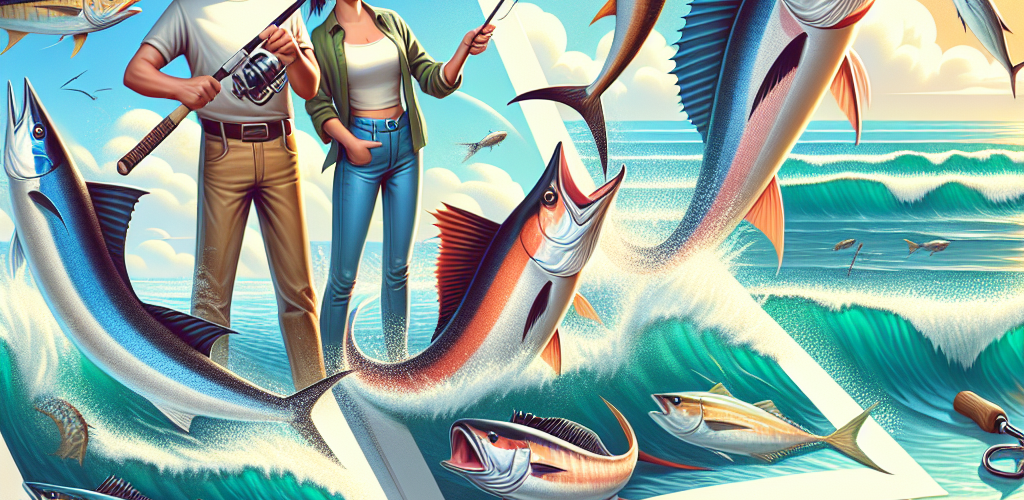Introduction
Are you fascinated by the vast blue waters and the thrill of catching your first big fish? Saltwater fishing can be an exhilarating experience for beginners, but without the right knowledge, it can also be daunting. In this guide, we’ll share essential tips and tricks to help you get started with saltwater fishing. From choosing the right gear to understanding marine weather, by the end of this post, you’ll be more than ready to cast your line into the sea!
Why Saltwater Fishing?
Saltwater fishing offers a unique adventure into the world of angling. Unlike freshwater fishing, saltwater environments host a larger variety of big game fish which often proves a rewarding challenge for enthusiasts.
What You Need to Know Before You Start
Gear Up
Choose the Right Rod and Reel:
- Rod: Opt for a medium-heavy rod about 7-9 feet long.
- Reel: A spinning reel is often easiest for beginners.
Essential Tackle:
- Hooks: Size depends on the type of fish you’re aiming for.
- Weights: To keep your bait below the surface.
- Leaders: Strong leaders prevent sharp-toothed fish from breaking your line.
Bait and Lures:
- Live bait: Includes shrimps, crabs, and squid.
- Lures: Plastic jigs and crankbaits are effective for various species.
Get a Fishing License
Before you head out, ensure you have a valid fishing license for the region you plan to fish in. This is not only a legal requirement but also supports marine conservation efforts.
Learn Basic Knots
Understanding how to tie a few basic fishing knots is crucial. Start with the Clinch Knot, one of the most popular knots used to secure a hook, lure, or swivel to your fishing line.
Understand Local Fish Species
Research the fish species available in your target fishing area. This knowledge will guide your choice of bait and fishing techniques.
Heading Out to Sea
Check the Weather and Marine Conditions
- Wind: Strong winds can make navigation tough and fishing uncomfortable.
- Tides: Fish activity varies with tidal movements. High tide is typically a good time to fish.
Safety First
- Wear a life jacket.
- Carry a first aid kit.
- Always inform someone of your fishing location and expected return time.
Respect Marine Life and Other Fishermen
- Follow catch and release practices if necessary.
- Maintain a proper distance from other fishing boats.
- Be aware of local marine protected areas.
Practical Saltwater Fishing Techniques
Bottom Fishing
Great for beginners, bottom fishing involves casting your line to the sea’s floor and waiting for a bite. It’s particularly effective for groundfish such as snappers and groupers.
Trolling
This moving technique involves dragging one or more baited lines behind a boat to attract fast-swimming fish like tuna and mackerel.
Jigging
Jigging involves lifting and dropping a weighted lure. It requires more effort but is effective for deeper water fish like amberjack and jack crevalle.
Common Mistakes to Avoid
- Ignoring weather reports: Can lead to dangerous situations.
- Poor maintenance of gear: Regular cleaning and storage are necessary to prolong your gear’s life.
- Overlooking local fishing regulations: Can result in fines or revoked fishing licenses.
Final Thoughts and Advanced Tips
While these basics will get you started, continual learning and patience are key to becoming a proficient saltwater angler. Don’t get discouraged by a bad day of fishing – each trip is a learning experience! As you gain more confidence and skill, consider advanced techniques like fly fishing or offshore fishing.
Ready to Cast Your Line?
Saltwater fishing is an incredibly rewarding hobby that connects you with nature and provides the thrill of the catch. By following these beginner tips, you’re well on your way to an enjoyable and successful fishing adventure. So gear up, hit the coastline, and enjoy the soothing sounds of the waves matched with the excitement of the chase!
Remember, this guide aims to provide beginners with the necessities for starting their journey in saltwater fishing. For your specific needs and targeted species, deeper research and local knowledge will be invaluable. Happy fishing!
[ad_2]



